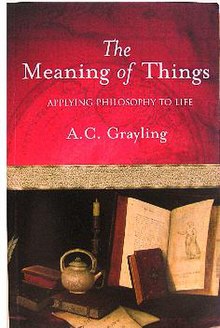Loading AI tools
From Wikipedia, the free encyclopedia
The Meaning of Things: Applying Philosophy to Life, published in the U.S. as Meditations for the Humanist: Ethics for a Secular Age, is a book by A. C. Grayling. First published in 2001, the work offers popular treatments of philosophical reasoning, weaving together ideas from various writers and traditions. It consists of short essays on a variety of subjects which, although deeply rooted in philosophy, are everyday phenomena encountered, recognized, and understood by everyone. The brief essays in the volume were originally published as installments in Grayling's "The Last Word" column in The Guardian.
This article needs additional citations for verification. (July 2023) |
 | |
| Author | A. C. Grayling |
|---|---|
| Language | English |
| Publisher | Weidenfeld & Nicolson |
Publication date | August 9, 2001 |
| Media type | |
| Pages | 196 |
| ISBN | 978-0297607588 |
Part I: Virtues and Attributes
Moralising —
Tolerance —
Mercy —
Civility —
Compromise —
Fear —
Courage —
Defeat —
Sorrow —
Death —
Hope —
Perseverance —
Prudence —
Frankness —
Lying —
Perjury —
Betrayal —
Loyalty —
Blame —
Punishment —
Delusion —
Love —
Happiness
Part II: Foes and Fallacies
Nationalism —
Racism —
Speciesism —
Hate —
Revenge —
Intemperance —
Depression —
Christianity —
Sin —
Repentance —
Faith —
Miracles —
Prophecy —
Virginity —
Paganism —
Blasphemy —
Obscenity —
Poverty —
Capitalism
Part III: Amenities and Goods
Reason —
Education —
Excellence —
Ambition —
Acting —
Art —
Health —
Leisure —
Pace —
Reading —
Memory —
History —
Leadership —
Travel —
Privacy —
Family —
Age —
Gifts —
Trifles
The 2001 hardcover edition of The Meaning of Things was published by Weidenfeld & Nicolson. A paperback edition was published in 2002 by Phoenix, an imprint of the Orion Publishing Group. The American edition hardcover edition was published by Oxford University Press in 2002. Weidenfeld & Nicolson, also an imprint of Orion Publishing Group, published a paperback edition in 2002 and a Kindle edition in 2011.[1]
Seamless Wikipedia browsing. On steroids.
Every time you click a link to Wikipedia, Wiktionary or Wikiquote in your browser's search results, it will show the modern Wikiwand interface.
Wikiwand extension is a five stars, simple, with minimum permission required to keep your browsing private, safe and transparent.